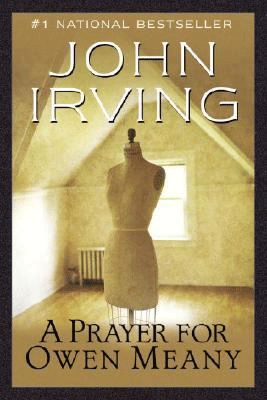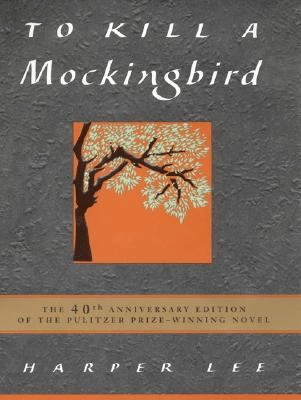

The American Library Association publishes a list every year that references those titles that were challenged during the last calendar year. After 21 years in publication, John Irving's A Prayer for Owen Meany still has the dubious honor of making the list. The enduring story of the friendship between two boys and its ability to survive even the ultimate tragedy is one of this prolific American authors treasures. While not without it's flaws, it does meander a bit, the reader is rewarded with a multi-faceted story that contains elements of mystery, pathos and humor. It's also one of those that Hollywood made into a movie several years ago starring Jim Carey. It was an entertaining but the book was so much better, check it out and see for yourself. (Click on the cover art for current availability.)
One of the original reviews: /* Starred Review */ Irving's novels, which often begin in autobiographical commonplace, get transformed along the way: sometimes into fairy tale (The Hotel New Hampshire), sometimes into modern-day ironic fable (The World According to Garp). This one--set in New Hampshire in the 50's and 60's--is a little of both, but not enough of either: its tone is finally too self-righteous to be fully convincing as fiction. In 1953, Owen Meany--a physically tiny man with a big voice who believes he's God's instrument--kills his best friend's mother with a foul ball. His best friend, Johnny Wheelwright, is the book's narrator: from Toronto, where he has lived for some 20 odd years, he tells the story of Owen Meany, who has a voice that "comes from God," of his own "Father Hunt"--Wheelwright is the product of his mother's "little fling"--and of growing up in the Sixties, when some people believed in destiny, others in coincidence. Sweetly moralistic, Wheelwright, who became "a Christian because of Owen Meany," sometimes launches into tirades about Reagan and the Iran/contra fiasco, but mostly he tells Owen's story: Meany, who always writes and speaks in the uppercase, is the real mouthpiece here, though Wheelwright is his Nick Carraway. Meany, after hitting "that fated baseball," no longer believes in accidents: his parents, in the granite business, convince him that he's the product of a virgin birth (we learn late in the book). His sense of destiny serves him well: not only does he play the Christ child in a Christmas pageant and the Ghost of Christmas Yet to Come, but his pontificating "Voice" becomes a great power at the prep school he attends with Johnny (there are some marvelous sent-ups of prep school), and he "sees" the circumstances and the date of his own death. After much inventive detail (as well as much slapstick and whimsy dealing with Meany's tiny size and strange voice) and the working-out of a three-way relationship involving Meany, Johnny, and his cousin Hester, Meany saws off Johnny's finger in order to keep him out of Vietnam, dies as he foresaw, and reveals to Johnny from beyond the grave that the local Congregationalist minister is his real father. Vintage Irving--though here Dickensian coincidence, an Irving staple, becomes the subject of the book rather than a technique. The result is a novel that seems sincere but turns too bombastic and insistent in its opinions about literature, religion, and politics. (Kirkus Reviews, February 15, 1989)


